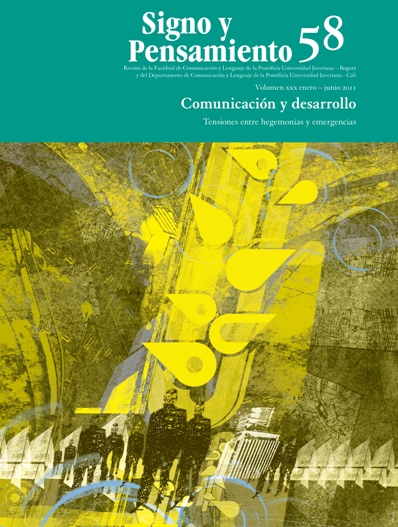Abstract
The main purpose of this paper is to take the postulates of Communication for Social Change as a reference and, within this framework, proceed with a critical reflection on the education received by social communicators in Chile; from here, we venture a new theoretical and methodological proposal whereby tools for curricular design are presented in order to offer students an adequate socio-cultural context vis-à-vis communication. In praxeological terms, in Chile, and in spite of the fact that the country has important historical references, Communication for Social Change, Communication for Development, and/or Participative and Alternative Communication are still in want in most educational spaces.
Del Valle, C. (2003), “Pertinencias y énfasis en la formación sobre comunicación para el desarrollo: diagnóstico y perspectivas de la experiencia iberoamericana”, Redes, núm. 1, pp. 255-272.
— (2007), “Comunicación participativa: aproximaciones desde América Latina”, Redes, núm. 4, pp.113-130.
Gumucio-Dagrón, A. (2001), Haciendo olas: historias de comunicación participativa para el cambio social. Informe para la Fundación Rockefeller, La Paz, Plural Editores.
Gumucio Dagrón, A. y Tufte, T. (2008), Antología de la comunicación para el cambio social: lecturas históricas y contemporáneas, La Paz, Consorcio de Comunicación para el Cambio Social, Plural Editores.
Leiva, F. (2010), “El etnodesarrollo, el programa Orígenes y la reorganización del Estado”, Santiago de Chile, Instituto de la Comunicación e Imagen de la Universidad de Chile y la Facultad de Educación y Humanidades de la Universidad de La Frontera, disponible en http://www.slideshare.net/ferleilet/sesion-3-el-desarrollo-con-identidad.
Mellado, C. y Del Valle, C. (2008), “Diagnóstico y perspectivas del periodismo como profesión: reflexión en torno a la formación de los profesionales de la comunicación en Chile”, Universum, vol. 2, núm. 23, Universidad de Talca-Chile, pp. 136-151.
Mellado, C. et al. (2010), “Mercado laboral y perfil del periodista”, Cuadernos de Información, Pontificia Universidad Católica de Chile, vol. 1, núm. 26, pp. 45-64.
Nitrihual, L.; Del Valle, C., y Mayorga, J. (2009), “Canción para tres cuerdas: medios, intelectuales y profesionalismo en el periodismo actual. El caso de dos escuelas de periodismo en Chile”, Cuadernos de Información y Comunicación (cic), vol. 1, Universidad Complutense de Madrid, pp. 317-327.
World Bank Web (1998), “Social Capital and Ethnicity”, [en línea] disponible en http://web.worldbank.org/WBSITE/EXTERNAL/TOPICS/ EXTSOCIALDEVELOPMENT/EXTTSO CIALCAPITAL/0,,contentMDK:20185286~menuPK:404103~pagePK:148956~piPK:216618~ theSitePK:401015~isCURL:Y,00.htm
This journal is registered under a Creative Commons Attribution 4.0 International Public License. Thus, this work may be reproduced, distributed, and publicly shared in digital format, as long as the names of the authors and Pontificia Universidad Javeriana are acknowledged. Others are allowed to quote, adapt, transform, auto-archive, republish, and create based on this material, for any purpose (even commercial ones), provided the authorship is duly acknowledged, a link to the original work is provided, and it is specified if changes have been made. Pontificia Universidad Javeriana does not hold the rights of published works and the authors are solely responsible for the contents of their works; they keep the moral, intellectual, privacy, and publicity rights.
Approving the intervention of the work (review, copy-editing, translation, layout) and the following outreach, are granted through an use license and not through an assignment of rights. This means the journal and Pontificia Universidad Javeriana cannot be held responsible for any ethical malpractice by the authors. As a consequence of the protection granted by the use license, the journal is not required to publish recantations or modify information already published, unless the errata stems from the editorial management process. Publishing contents in this journal does not generate royalties for contributors.


